
(Matthew 16:13-23)
May these words of this Peter be like a rock,
not a stumbling block!
|
|
"Who do you say
that I am?" Jesus asked. Simon Peter answered, "You
are the Messiah, the Son of the living God." And Jesus
answered, "Blessed are you, Simon son of Jonah! ... You are
Peter (petros), and on this rock (petra)
I will build my church..." Jesus then began to speak of
the rough road ahead. And Peter took him aside and rebuked him... "Get
behind me, Satan!" Jesus replied. "You are a stumbling
block..." (Matthew 16:13-23) May these words of this Peter be like a rock, |
"Dad, can I have the car keys?"
Message preached June 15, 2003
Long Green Valley Church of the Brethren
Glen Arm, Maryland USA
based upon Matthew
6:9, Romans
8:12-19
A
newspaper hides his face. Two legs extend to the floor from the bottom of the
page. On either side are positioned four fingers. Thatís all you see as you
approach. Getting up your courage, you ask: "Dad, can I have the car
tonight?" The paper stirs. A head emerges. "Whatíd you say?" he
asks, his mind still absorbed in the events of the day. "Dad, Iíd like to
go somewhere tonight, could I borrow the car?" What follows is a question
and answer session.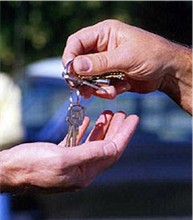
"Did you ask your Mom?"
"Where are you going?"
"What are you going to do?"
"Do you have money?"
"Is your homework done?"
The questions have to be answered before the car keys come out. But not before the lecture. Words on responsibility. To be entrusted with horsepower, means to take care of the horse - the horse under the hood, and the horse in the head. Finally, the jingling mass of metal exchanges hands. As Fatherís head sneaks back to his newspaper cave, he utters those words which all parents say when they canít think of anything else: "Just Be Careful!"
* * * * * *
"Our Father which art in heaven," we pray, in words we have said over and over. "Our Father," we pray, looking up to the vast celestial newspaper. We catch a glimpse of his hand here, his foot there. But Godís face seems hidden behind the events of the day. "Our Father," we pray, not really sure if there is a face behind the page. And if there is, we wonder - is it graced by a smile or a frown? Or does God even care?
After all, we who stand before the Lord are so small in comparison to the mighty deeds of the day. Weapons of mass destruction, terrorism, war, Sars, AIDS, Cancer, unemployment, deficits, stock market slumps, taxes, pollution, collisions of religions, the movers and shakers, the breakers and takers, crime, drugs, prisons, the homeless, the helpless, the careless, the thoughtless ... the big issues of the day which clutter our newspapers.
There must
be so much on Godís mind. We are so small in comparison with the really big
things. And yet, we still pray, "Our Father, which art in Heaven." Do
we really expect the paper to stir, and Godís face to appear? Or are we just 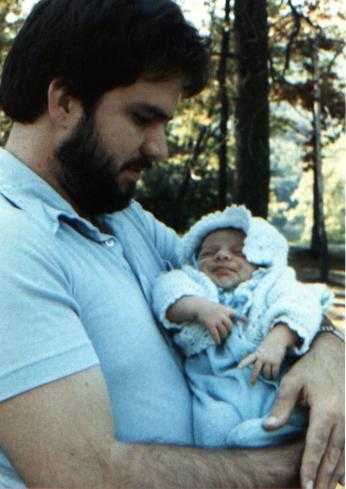 mouthing the words? Jesus taught us to pray that way. Not to just mouth the
words, but to pray expecting something to happen, a rustling of the celestial
paper.
mouthing the words? Jesus taught us to pray that way. Not to just mouth the
words, but to pray expecting something to happen, a rustling of the celestial
paper.
Pray to God as a child would, Jesus said. What were some of those first words? "Da-da," "Mo-ma," or in the language of the New Testament - "Abba," "Imma." A child learns to cry out a parentís name, because when that name is uttered, a caring hand responds. The name is not uttered in vain. "Our Father in Heaven," "Abba," "Daddy," Jesus taught us to pray. God is not just some far off universal power. God is as near as a childís cry. Jesus taught us that, while mighty events go their course, God still is concerned with little things. When we pray to "Abba," the paper disappears and God responds. If we believe that God is too big to be concerned with little things, then our God is too small.
When he taught us to pray, "Our Father," Jesus was keying us into our earliest memories of parental care. We hurt for those children who have never experienced that type of love - those abandoned at birth, or raised in a uncertain home, or with an abusive parent. Even if they have never experienced such care, it is our prayer that deep within them is still a yearning for it, which can lead them eventually to their loving "Abba" in heaven who will provide for them when they ask. "Our Father which art in heaven," we pray. God is personal. We can have a close, intimate relationship with the "Master of the Universe." Thatís what the Lordís prayer means when it patterns for us a prayer to our "Abba."
Of course, thatís not all it says. Have you ever realized what you are saying when you pray "Our Father which art in Heaven" followed by "hallowed be thy name?" By calling to our heavenly "Daddy," we become aware of how intimate we can be with the Lord. We can call out and expect a caring reply. However, we then pray about the holiness of Godís name. God, yes, is as near and dear as a loving parent. However, God is also always above and beyond the children of Israel. Close, yet distant. Dependable but not controllable.
As the
Bible reveals, God doesnít want to get tied up in a name game. When God gave
Moses his marching orders from the burning bush, Moses asked, "Lord, when
they ask who sent me, what am I supposed to say? Whatís your name?" God
replied, "I am who I am! tell them ĎI Amí sent you." God did not
want this name to be batted around and abused. God didnít want Moses dropping
this name in some power game. In fact thatís a pretty steady theme throughout
scripture. "Thou 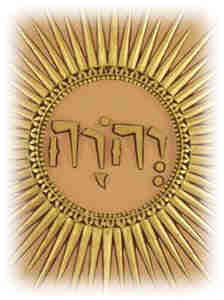 shalt not take the Lordís name in vain,"
says one of the commandments.
shalt not take the Lordís name in vain,"
says one of the commandments.
God was pretty serious about this. And those who wrote down the Torah took it seriously, and those who read it took it seriously. Whenever they came upon the four letters in Hebrew that constituted Godís name, they would substitute the word "Adonai" or "Lord," instead of uttering this most holy of words. In that way they honored, they "hallowed" Godís name. They had to think before speaking. Do we pause before we speak it? ... When we pray "hallowed be thy name," we are placing ourselves before a burning bush, so to speak. "Take off your shoes," God told Moses, "for you are on holy ground." Here the fiery presence of God transforms us.
With this in mind, isnít it a bit strange that Jesus would put these two phrases together? "Our Father in heaven, hallowed be thy name." "Abba," a word of intimacy and assurance, together with the name which is above every name - so holy, so beyond us that we dare not approach with our shoes on. Do the two fit together? On the one hand we expect the loving, caring voice of our heavenly Daddy. On the other we grow to expect the unexpected, a God who speaks with power, who will not be taken for granted - a God who has something to say to us, a mission upon which to send us, a burning presence.
Do the two fit together - the closeness and the distance of God, who is dependable but not controllable? Perhaps that is the radical aspect of this prayer Jesus taught us. God is very intimate with us. God is very close. God is near. And God is holy. God is a burning, transforming presence in our lives. We donít control God. I believe thatís an important reminder.
I seem to remember a little bedtime game we used to play in our home? "Daddy, I need a glass of water." "Daddy, I need to go potty." "Daddy, I had a bad dream," even though neither eye had been shut for long. "Daddy, I need ..." some stuffed animal or a doll not already on the overcrowded bed. Or, "just lie down with me, Daddy."
Thatís
part of being a kid. Thatís a part of being a Dad - something to celebrate on Fatherís
Day. On the one hand, 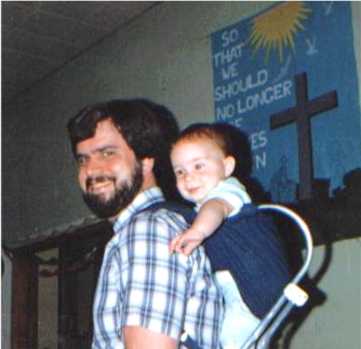 itís a matter of intimacy. Children need loving
fathers and mothers. On the other hand, the issue is Ďcontrol.í A child is
trying to have some control over her world. Thatís how he grows. Itís a part
of being a kid. Of course, with time, comes more maturity. A child grows up, and
hopefully that need to control his or her world will have matured as well.
itís a matter of intimacy. Children need loving
fathers and mothers. On the other hand, the issue is Ďcontrol.í A child is
trying to have some control over her world. Thatís how he grows. Itís a part
of being a kid. Of course, with time, comes more maturity. A child grows up, and
hopefully that need to control his or her world will have matured as well.
You notice I am able to say this so rationally here and now. I assure you, though, this "Daddy" still has a long way to go when it comes to things like "patience," especially as my children grow and the natural push and pull of parenting moves up a notch or two. The "burning bush" my children face when they come to me is at times anything but holy. I donít like being controlled, any more than my children do.
Perhaps we all tend to play similar games with God. Thankfully, our "Abba" is a better parent than any of us. Lord, I count on it! God, after all, has infinite patience. "Daddy," we may sometimes pray, in an effort to avoid doing what we have been called to do. "Hallowed be thy name" is a reminder, as we pray, not to use God to avoid our responsibility. You see, God does give us the car keys. We donít forever ride in our baby seats.
We are entrusted with spiritual horsepower. We bear responsibility for the "horse" - the horse under the hood, so to speak, and the horse in the head. Our "Abba," our heavenly Father provides for our needs, indeed! But Godís providence is for a purpose. The Holy One calls us to a life beyond ourselves - a life burning with a desire to do and to be what God created us to do and to be. And all of Creation, scripture says, is waiting for that to happen.
* * * * * * * *
Now on a
day such as today, we recognize one of the ways God calls some of us. It is an
awesome thing, isnít it, to be an earthly father to our children. Itís a
wonder and a glory and an honor. Weíre standing on holy ground, whether weíre
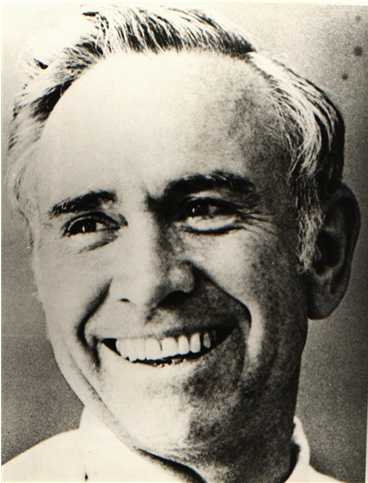 conscious of it or not. Of course, at times it may seem an impossible
responsibility, requiring of us more than we feel capable. I have to remember
the night my Dad handed me the car keys as a teenager and I stayed out till -
well, letís just say it was more than "late." Our football team had
just beat our arch-rivals, and that was cause to celebrate. I wasnít out
drinking, mind you. I just didnít call home when I should have.
conscious of it or not. Of course, at times it may seem an impossible
responsibility, requiring of us more than we feel capable. I have to remember
the night my Dad handed me the car keys as a teenager and I stayed out till -
well, letís just say it was more than "late." Our football team had
just beat our arch-rivals, and that was cause to celebrate. I wasnít out
drinking, mind you. I just didnít call home when I should have.
When I did arrive, the lights were on and I knew I was in trouble. The other car was missing, and when I stepped inside my mother was playing an exceptionally noisy game of solitaire. Dad was driving through the countryside looking for my car, praying the whole time to his heavenly father - Iím sure - that he wouldnít find it wrapped around some tree. What a seemingly impossible responsibility he bore. Did he feel capable? Do any of us? Though we had our struggles, I know my father loved me, as did (and does) my Mom. From my earthly father, from both my parents, I learned about my heavenly Father. For that I am thankful.
Now, our final hymn is not about our earthly fathers. A Brethren woman in her twenties wrote the words a long time ago. Perhaps as you sing it, you can remember walking as a child with your earthly father, as you sing to your heavenly one. Perhaps those memories arenít good ones, however, for some fathers fail to recognize how holy this ground is that we walk upon as parents. Even so, I invite you, I invite you all, to turn completely - as you sing - to your heavenly "Abba" who is always within reach, dependable though not controllable. "Take my hand and lead me, Father..."
| online resources for this scripture text |
For commentaries consulted, see Romans. |
©2003 Peter
L. Haynes
(you are welcome to borrow and, where / as appropriate, note
the source - myself or those from whom I have knowingly borrowed.)